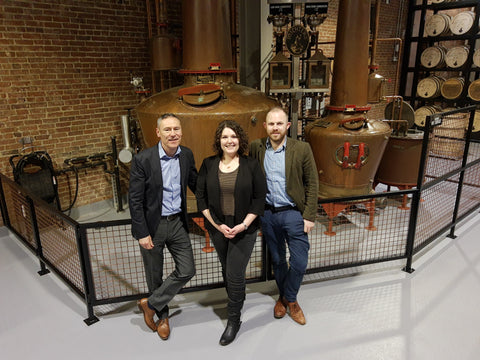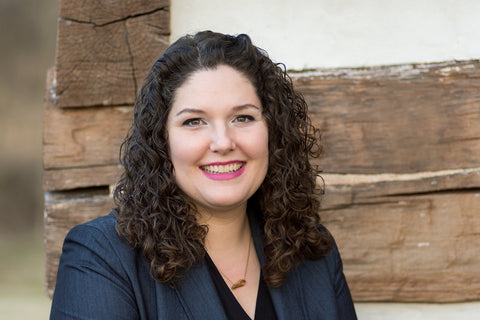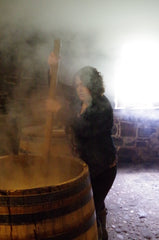![Bourbon Women and Whiskey Journalism with Maggie Kimberl [Interview]](http://drinkingvessels.com/cdn/shop/articles/Maggie_Kimberl_bourbon_books_and_bottles_2048x.jpg?v=1614459488)
Bourbon Women and Whiskey Journalism with Maggie Kimberl [Interview]
There had always been a perception that it was a man's drink and a perception that only men were involved in the industry. In reality, women have always been drinking bourbon, women have always been involved in the industry, but there was really nobody speaking to women about this industry.
Maggie Kimberl will be the first to tell you that her journey into the bourbon industry is impossible to replicate. But it’s undeniable she struck lightning, and these days, Maggie is one of the most respected and prolific writers in American whiskey. She’s President of the Bourbon Women Association and Content Editor for American Whiskey Magazine, dual roles which take her to all corners of bourbon production, sales, marketing, and lore. If you’re reporting on the current landscape of bourbon, most roads will eventually lead to Maggie.
I sat down with Maggie to discuss her unlikely career path, along with how the explosion of American whiskey has spawned new genres in spirits journalism. We also discuss her work with Bourbon Women and how that organization aims to serve a passionate bourbon community that history has all too often overlooked.

David: Maggie, you have an interesting career in the spirits space. You are a renowned bourbon and whiskey journalist and content creator. How do you go about becoming a whiskey journal?
Maggie: The one thing I tell people is I could not duplicate what I did today. My philosophy when I started out was do what you can, where you are with what you have. I double majored in English and philosophy writing and researching was a big part of who I am, and that's my skill set that I was building on. Then I was a stay-at-home mom for a while. I have two kids, and when they were little, that was all I did was a stay at home mom for three years. And it is the hardest job I've ever had to date! When they started to get a little bit older, I got a part-time job at the liquor store. So I started working evenings because there are no kids there and you can go and have adult conversations, and it's just lovely.
That was back when master distillers would come and sit in the stores and sign bottles and do tastings and things like that, which is almost unheard of today. So I got to meet a bunch of different master distillers, from Jimmy Russell to Chris Morris. The one who was really impactful to me was Jim Rutledge, who was with Four Roses at the time. This was before he retired. And he was in my store during Derby week doing a tasting and a bottle signing. And I don't know if you've ever heard of the Kentucky Derby. It's kind of a big deal around these parts. Everything in all of Kentucky is just pandemonium during Derby week. And the liquor store is no exception to that.

It was so busy that I didn't get a chance to actually talk to him. And then I had to go on break and he was packing up to leave. And I went back and sat in the break room, I was eating my sad little peanut butter sandwich. And the next thing I knew, he came through the door with bottles in one hand and cups in the other. He said, "You didn't get to do my tasting." And so he sat down with me for probably about 20 minutes and he taught me the proper bourbon tasting technique, a little bit of the history of Four Roses, why they have 10 different recipes and all that kind of stuff. And that was really my "aha!" Moment. I was like, this stuff is amazing. This is what I'm meant to be doing in some form. And I quit my job and started writing about whiskey shortly after that.
David: I'm sure it wasn't as simple as you sat down and started writing about whiskey and suddenly you had a career. You had to write to outlets, reach out to people.
Maggie: There was a point in time where I was trying to figure out the balance: I know I want to write things, but I also want to be paid the right things. I don't want to do it for fun. And I read something at one point where it was literally: you start with a smaller outlet and then you get a job with a larger outlet. Then you get a job with a larger outlet and then you get a book deal. So the first outlet that I worked for was Louisville.com, and I was the local bourbon beat writer for about three years doing that. That was really a great experience because it didn't pay super well, but I had pretty much unlimited freedom to do whatever I wanted.
And I really leveraged that to get out there and meet people, cover events and go places that I otherwise wouldn't have been able to go. And then I started writing for a publication called The Whiskey Wash. This is a national publication, and that is based in Portland, Oregon, and I wrote for them for about two and a half years. And then during that time, I also started writing for Alcohol Professor, which I'm still a contributor to. And then I started writing for Whisky Magazine, which was really my big break. I was with whiskey magazine for so long that when they launched American Whiskey Magazine, that was something that they asked me to be a part of as well. So I've been writing for American Whiskey Magazine since the first issue, and I'm now the content editor of American Whiskey Magazine.
David: When did that officially launch, and what's the reception been like launching that kind of sub imprint of an existing publication?
Maggie: Whisky Magazine, when it started, was really largely about Scotch. The publisher of that, Damian Riley Smith, is actually a really huge fan of Kentucky bourbon. He is a British man who loves to go to Bardstown, Kentucky, and he is in the Kentucky Bourbon Hall of Fame. He had this love for American whiskey and saw it growing so much. Around 25 years ago, when Whisky Magazine was getting started, American whiskey was a very small category and there were basically two distilleries in Tennessee and eight distilleries in Kentucky.
And for the most part, that was it. There were some large, factory style distilleries like MGP and then some other ones, but really, as far as making high quality premium aged spirits, it was very small. Over the last 10 years, there's been so much category growth in American whiskey. We're up to, I think, thousands of distilleries, or at least several hundred. He realized that there was enough to talk about in the United States of America, that it warranted its own separate title. And so the reception has been just phenomenal. People have really stepped up and subscribed and participated.
David: Let's talk about the Bourbon Women Association. What is it, and how did you get involved?
Maggie: That's a great question. For those of you following along at home, I was just named the President of the Bourbon Women Association. We have members all over the United States. We have around 12 chapters and are looking at three or four emerging chapters right now. This is a group that was founded by Peggy Noe Stevens. She was the first woman in the Kentucky bourbon industry to be named Master Taster. And she trained under Lincoln Henderson, who then went on to start Angel's Envy with his son and his grandson. He was the father of the Woodford Reserve brand.
And he was just a legend in the industry. And he handpicked her and said, "You know, women have better olfactory senses than men. So maybe you should do this." He worked with her and trained her on how to do that. When she was weaving the corporate life, she thought, "I really want to do something that gives back and really speaks to this lack of marketing going to women." There had always been a perception that it was a man's drink and a perception that only men were involved in the industry and things like that. In reality, women have always been drinking bourbon, women have always been involved in the industry, but there was really nobody speaking to women about this industry.

Photo credit: Michele Korfhage
That was her vision that she wanted to really grow. We're celebrating our 10th anniversary this year. We just celebrated a fantastic event coming in February called "Toast to the 10th." It was a virtual event that featured 12 or 13 different distilleries across the United States. For the long term, it's really just going to be about growing and spreading our message. We really want women to understand that yes, you belong here and yes, there is a place for you. And we want to have fun, and we want to provide opportunities for women to have fun around bourbon culture.
David: That's fantastic. How did you come to be President?
Maggie: Peggy asked me specifically, which was a huge honor, to have the founder of the organization say she wanted me in that position. Peggy and I have worked together on American whiskey magazine. She's one of my blind tasters and writes for the magazine as well. And so she and Susan Reigler, who is another founding member, sat down and said they thought I'd be a good fit for the position. That was a huge honor.
David: What would you like to do in the whiskey industry that you haven't done yet?

Maggie rowing mash at George Washington's Mount Vernon Distillery
Maggie: The way that I have approached my career so far is I want to learn as much as I can learn. So I've actually gone into distilleries hands-on and done the mashing and the distilling and things like that. I go to George Washington's Mount Vernon distillery once a year, and I'll spend an entire day in the distillery rowing mash. There's a photo of me that's going around with the big paddle in front of the barrel. And that's me rowing mash, which is the way that it used to be done. It used to be a very hands-on physical activity. I've learned a lot about how the stills work and how the fire works and all that kind of stuff, because those are wood-fired stills.
I would really love to get into a modern distillery and kind of learn how some of that equipment works. I would love to learn how yeast propagation works. I'm writing about yeast and researching yeast and talking to experts in yeast. The next step from when I do a story is I want to get in there and do it. Personal goals: I want to learn more and I want to do more. I want to experience it all.
David: It sounds like you should schedule a trip out to Danville and talk to the Wilderness Trail folks for yeast knowledge.
Maggie: They're great folks. And they know so much about yeast. Absolutely.
David: Where is the best place for people to follow along with the work you're doing?
Maggie: You can find my work on AmericanWhiskeyMag.com. Then WhiskyMag.com and BourbonWomen.org. Personally, you can find me on Twitter (@LouGirl502) and Instagram (@LouGirl502). You can also check out my personal website, LouGirl502.com.
I love hearing from people. So definitely reach out if you want to learn more about anything that’s going on with any of those organizations.
This interview was moderated by David Thomas Tao, our resident whiskey and bourbon expert here at Drinking Vessels. If you have burning whiskey questions, let us know and we'll get you the answers from the experts.
Leave a comment
Comments will be approved before showing up.
Also in Cocktail Corner

Ghia Founder Melanie Masarin on Flavor, Function, and Changing the Conversation About Zero Proof Spirits
![Amaro, Boxed Cocktails and More with Louie Catizone of St. Agrestis Spirits [Interview]](http://drinkingvessels.com/cdn/shop/articles/St_Agrestis_Negroni_-_The_Brothers_Buoy_1200x.png?v=1615252641)
Amaro, Boxed Cocktails and More with Louie Catizone of St. Agrestis Spirits [Interview]
![Cocktail Booms and Liquor Trends in 2021 with Ivy Mix [Interview]](http://drinkingvessels.com/cdn/shop/articles/Old_Fashion_Cocktail_Mixology_with_Emily_Marie_Handmade_Rocks_Glass_1200x.jpg?v=1612115585)

